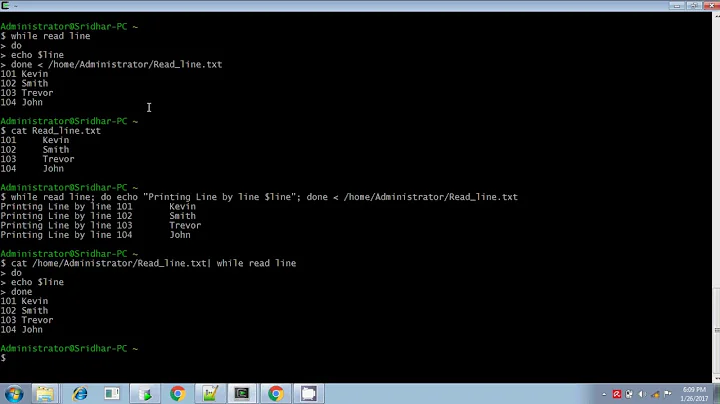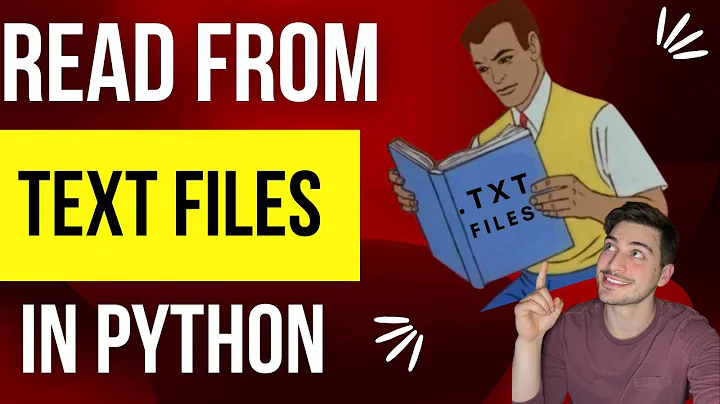Why can't you use cat to read a file line by line where each line has delimiters
Solution 1
The problem is not in cat, nor in the for loop per se; it is in the use of back quotes. When you write either:
for i in `cat file`
or (better):
for i in $(cat file)
or (in bash):
for i in $(<file)
the shell executes the command and captures the output as a string, separating the words at the characters in $IFS. If you want lines input to $i, you either have to fiddle with IFS or use the while loop. The while loop is better if there's any danger that the files processed will be large; it doesn't have to read the whole file into memory all at once, unlike the versions using $(...).
IFS='
'
for i in $(<file)
do echo "$i"
done
The quotes around the "$i" are generally a good idea. In this context, with the modified $IFS, it actually isn't critical, but good habits are good habits even so. It matters in the following script:
old="$IFS"
IFS='
'
for i in $(<file)
do
(
IFS="$old"
echo "$i"
)
done
when the data file contains multiple spaces between words:
$ cat file
abc 123, comma
the quick brown fox
jumped over the lazy dog
comma, comma
$
Output:
$ sh bq.sh
abc 123, comma
the quick brown fox
jumped over the lazy dog
comma, comma
$
Without the double quotes:
$ cat bq.sh
old="$IFS"
IFS='
'
for i in $(<file)
do
(
IFS="$old"
echo $i
)
done
$ sh bq.sh
abc 123, comma
the quick brown fox
jumped over the lazy dog
comma, comma
$
Solution 2
You can use IFS variable to specific you want a newline as the field separator:
IFS=$'\n'
for i in `cat file`
do
echo $i
done
Solution 3
cat filename | while read i
do
echo $i
done
Solution 4
the for loop coupled with a change of the internal field separator(IFS) will read file as intended
for an input
abc 123, comma
the quick brown fox
jumped over the lazy dog
comma, comma
For loop coupled with an IFS change
old_IFS=$IFS
IFS=$'\n'
for i in `cat file`
do
echo $i
done
IFS=$old_IFS
results in
abc 123, comma
the quick brown fox
jumped over the lazy dog
comma, comma
Solution 5
IFS - Internal field separator can be set to get what you want.
To read a whole line at once, use: IFS=""
Related videos on Youtube
Classified
Updated on April 02, 2021Comments
-
Classified about 3 years
I have a text file that contains something like this:
abc 123, comma the quick brown fox jumped over the lazy dog comma, commaI wrote a script
for i in `cat file` do echo $i doneFor some reason, the output of the script doesn't output the file line by line but breaks it off at the commas, as well as the newline. Why is cat or "for blah in
cat xyz" doing this and how can I make it NOT do this? I know I can use awhile read line do blah balh blah done < filebut I want to know why cat or the "for blah in" is doing this to further my understanding of unix commands. Cat's man page didn't help me and looking at for or looping in the bash manual didn't yield any answers (http://www.gnu.org/software/bash/manual/bashref.html). Thanks in advance for your help.
-
chepner almost 11 yearsSimply use
IFS= read -r lineto preserve all whitespace in the line. -
 Jonathan Leffler almost 11 yearsThe only reason the spacing is 'lost' with the
Jonathan Leffler almost 11 yearsThe only reason the spacing is 'lost' with thewhileloop is because you usedecho $linerather thanecho "$line". If spacing is important, enclose the variable reference in double quotes. -
Charles Duffy almost 11 yearsAs chepner says, this should be
read -rto avoid unintended side effects (evaluating backslash escape sequences). -
Charles Duffy almost 11 yearsUnsafe -- you've prevented string-splitting, but you haven't prevented glob expansion. If a line contains
*, that will be expanded to a list of names in the current directory during the echo. -
Classified almost 11 yearsthx for your help and reply. I'm a little confused here with bash/*nix. I didn't change IFS. It's set as a newline by default. I checked it with echo "IFS = $IFS word test" and the string "word test" got printed to the following line so we know it's \n by default. In any case, using the default IFS, it breaks my line at the comma even though IFS=\n. When I do as you suggested above, by setting the IFS explicitly to \n, then it prints my whole line without breaking over the comma. Any idea why it works when it's explicitly set as \n and not work when by default IFS is already \n? Thanks again.
-
 Jonathan Leffler almost 11 yearsThe default value of IFS is (using a piece of
Jonathan Leffler almost 11 yearsThe default value of IFS is (using a piece ofbash-speak)$' \t\n'; that is, it consists of blank, tab, newline. This probably alters your analysis. When you say 'breaks at the comma', you mean it breaks at the space after the comma, I believe, which is consistent with IFS containing blank (and tab and newline).











